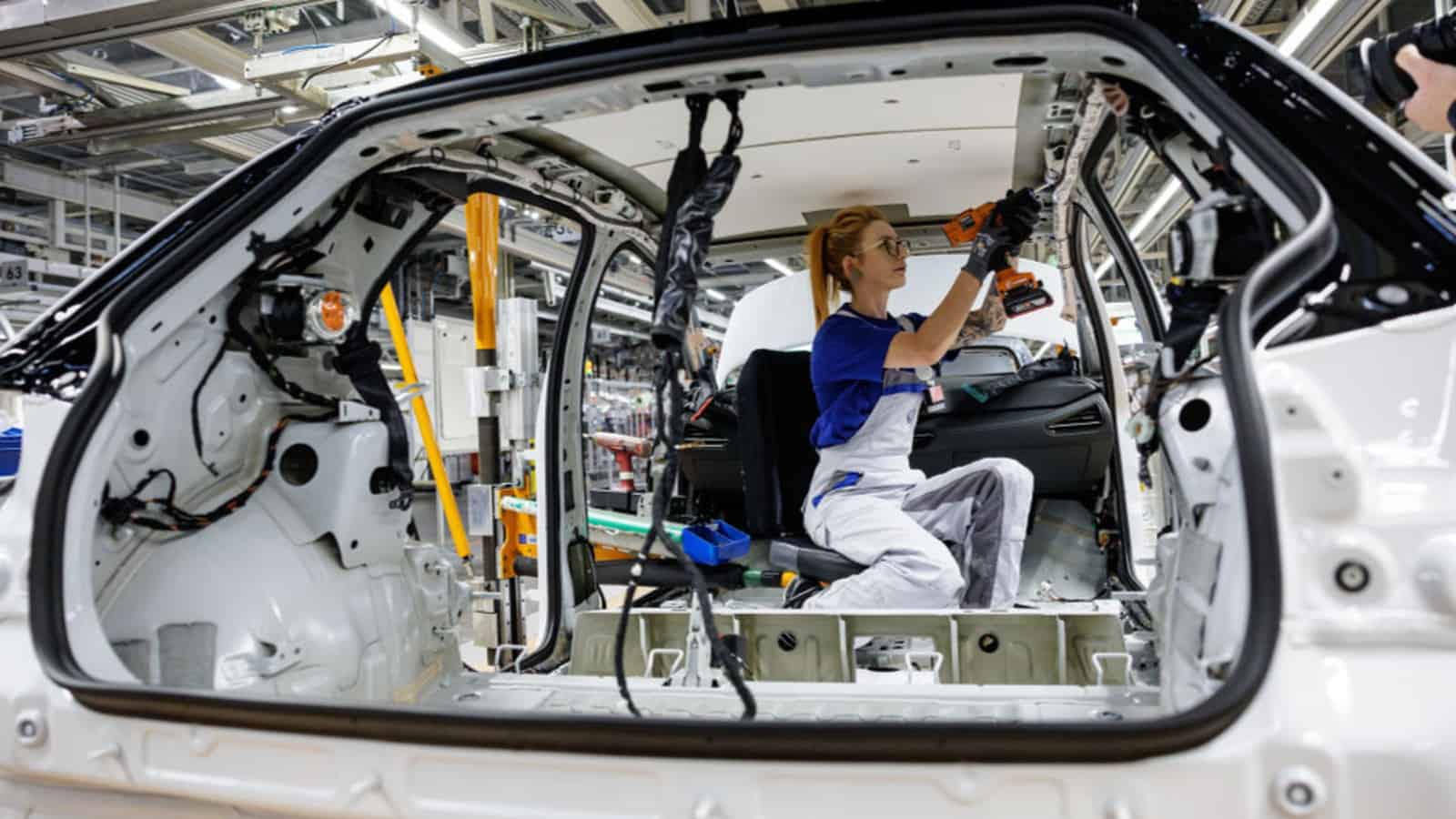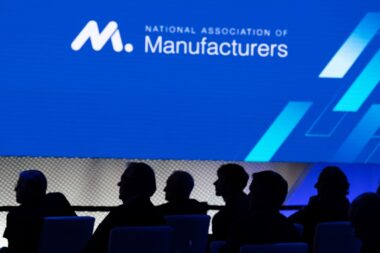NAM to Congress: Protect Manufacturers from SEC Overreach and ESG Activists

Manufacturers across the United States are driving economic expansion while also supporting sustainable business practices, enhancing diversity in the workforce and combatting climate change. Yet, politically motivated activists threaten to slow this progress by insisting on their own narrow agendas. Recent actions by the Securities and Exchange Commission will empower these groups and divert resources from manufacturers’ investments in job creation and business growth.
As the Financial Services Committee in the House of Representatives begins a monthlong hearing series on environmental, social and governance topics and other issues related to the proxy process, NAM President and CEO Jay Timmons is calling on Congress to rein in the SEC’s regulatory overreach and keep activists out of the boardroom.
Depoliticizing corporate governance: Activists on the left and right are increasingly abusing the proxy ballot to advance narrow social and political agendas. The SEC has taken steps in recent years to support and empower these activists.
- The NAM is suggesting reforms to the rules governing shareholder proposals that will prevent activists from hijacking the proxy ballot in pursuit of political agendas unrelated to long-term business growth and shareholder value creation.
Reining in proxy advisory firms: Despite their significant conflicts of interest, errors and lack of transparency, proxy firms exercise outsized influence on corporate governance. More oversight and accountability are needed to protect manufacturers and Main Street investors from these powerful actors.
- The NAM is pressing Congress to ensure that proxy firms are regulated appropriately by the SEC—including by requiring that the firms disclose and manage their conflicts of interest and allow companies to review their draft recommendations.
Protecting Main Street investors: In the face of pressure from ESG activists and proxy firms, the financial institutions that manage Americans’ 401(k) accounts and pension plans must take steps to protect these Main Street investors’ retirement savings.
- The NAM is calling on lawmakers to ensure that asset managers cast proxy votes and make investing decisions solely in Main Street investors’ financial best interests—and without over-relying on proxy firms and ESG ratings organizations.
Limiting ESG disclosure mandates: The SEC’s aggressive ESG rulemaking agenda will increase costs and liability for manufacturers and overwhelm investors with a deluge of irrelevant information.
- The NAM is urging Congress to limit any SEC disclosure mandates to information that is material to shareholders’ investing and voting decisions.
The last word: “Congress must step in to depoliticize the business decisions that impact the lives and life savings of millions of Americans,” said Timmons. “Manufacturers are determined to create jobs, lead the economy and improve the quality of life for all Americans. We are counting on [Congress’] leadership to counter the SEC’s regulatory overreach and help us achieve these goals.
Immigration Is a Personal Cause for This Manufacturing Leader

For Fernando Torres, the vice president of operations at thermoplastics manufacturer Greene Tweed, the issue of immigration is personal. In 1996, at the age of 16, Torres immigrated to the United States. He was undocumented for a time, and he was forced to figure out how to stay afloat.
His story: Alone, without stable residency and barely speaking the language, Torres had a harrowing start in the U.S. But he worked his way through community college, where he excelled in math courses even though he wasn’t yet fluent in English. Torres attributes his love for math and science to his grandfather, who he says is the smartest man he’s ever met.
- “I had a difficult situation at the age of 16 in a new country without knowing the culture or the language, asking, what am I going to do?” said Torres. “Living in this country, it’s the country of opportunities, so I had to find ways to make it work and pursue the American dream.”
- “But, as an undocumented person, the jobs available were not pretty. Whether I was washing dishes at a seafood restaurant or cutting the lawns in Arizona in the middle of the 120-degree weather summers, I just had to find a way to survive.”
Entering the industry: After community college, Torres was accepted into Arizona State University’s program for aerospace engineering—and eventually, he found a place in the commercial sector at Greene Tweed. Today, he’s a U.S. citizen, and he’s just as passionate as ever about the value of immigration.
Immigration and manufacturing meet: Torres has seen the skills gap in manufacturing firsthand, and he knows how difficult it is to fill critical jobs. That’s one reason why immigration is so important to the manufacturing industry, he pointed out.
- “There is a shortage of people,” said Torres. “Skilled laborers are very difficult to find in our country, and retirements are outpacing anyone that’s coming in. There’s not enough people to run our factories—and if we want the economy to grow, we need people to grow it.”
An economic issue: Torres also emphasized that a person’s stance on the issue of immigration in manufacturing should come down to economic considerations.
- “We need to stop talking about immigration as a political issue—it’s a business issue,” said Torres. “We don’t have enough people to grow this economy internally. And if we can’t grow it internally, we have to open factories elsewhere. So this isn’t a political need, it’s an economic need.”
NAM’s push for change: NAM has long fought for commonsense immigration reform and outlined a series of proposals in A Way Forward—a road map that covers border security, reforms to legal immigration and permanent solutions for populations like DREAMers that are facing uncertainty.
The last word: “Immigrants are here to give, not to take away from this country—and we give a lot,” said Torres. “If it wasn’t for the waves of immigration during the last century to the United States, we wouldn’t be the number one economy in the world.”
NAM Doubles Down on PRO Act’s Dangers

The Protecting the Right to Organize Act would “devastate workplaces” if enacted, the NAM told the Senate this week.
What’s going on: The PRO Act—introduced in February by Rep. Robert C. Scott (D-VA) purportedly to expand labor protections—would do significant harm to manufacturers, NAM Director of Labor and Employment Policy Brian Walsh told Committee Chairman Bernie Sanders (I-VT) and Ranking Member Bill Cassidy (R-LA) Tuesday.
What it would do: The PRO Act contains “proposals that would constitute the most radical rewrite of our nation’s employment laws in nearly 100 years,” including:
- Removal of the right to a secret ballot in union elections and the institution of “card check”
- Elimination of right-to-work statutes in the 27 states in which they are law
- Forced payment of union due even by non-union-supporting employees
- A ban on employers talking to their workers about unions without the involvement of a union representative
What should be done: Walsh urged the committee members “to oppose this misguided attempt to fundamentally restructure American workplaces” and instead put their support behind measures that truly support employees.
- “We look forward to opportunities to continue working with members of the [c]ommittee … on legislation such as the Employee Rights Act (S. 1201) to advance productive solutions that meet the needs of today’s workers,” he said.
Manufacturing Associations Launch Coalition to Curb Regulatory Onslaught in Washington
Sector Requests Senior-Level Adviser Designated to Coordinate Efforts Among Agencies Within the White House
Washington, D.C. – Today, the National Association of Manufacturers, members of the NAM’s Council of Manufacturing Associations and Conference of State Manufacturers Associations launched Manufacturers for Sensible Regulations, a coalition addressing the impact of the current regulatory onslaught coming from federal agencies.
According to the NAM’s Q2 2023 Manufacturers’ Outlook Survey, more than 63% of manufacturers report spending more than 2,000 hours per year complying with federal regulations, while more than 17% of manufacturers report spending more than 10,000 hours.
“President Biden and Congress have prioritized strengthening the manufacturing sector in America through historic legislation like the Bipartisan Infrastructure Law, the CHIPS and Science Act, initial permitting reform actions in the Fiscal Responsibility Act and even some energy provisions in the Inflation Reduction Act,” said NAM President and CEO Jay Timmons. “Unfortunately, the continued onslaught of regulations is having a chilling effect on investment, curtailing our ability to hire new workers and suppressing wage growth, especially for small and medium-sized manufacturers. The recently released regulatory agenda from the administration shows this barrage isn’t stopping.”
“Washington is creating tremendous doubt across our sector at a time when we’re still dealing with economic uncertainty. And the unbalanced regulations coming out of this administration threaten to undermine our ability to grow, compete and win on a global scale,” said American Cleaning Institute President and CEO, NAM board member and CMA Chair Melissa Hockstad. “We want President Biden’s manufacturing agenda to succeed. Unfortunately, we are seeing the signs that the regulatory agenda is jeopardizing the investments enacted over the past 18 months.”
“U.S. pulp and paper manufacturers recognize the need to address the challenges of our changing climate and share the administration’s goal to secure a more sustainable future,” said American Forest & Paper Association President and CEO Heidi Brock. “This can only be achieved by working with—not against—manufacturers to craft achievable and balanced regulations that address environmental challenges without threatening manufacturing jobs.”
“Manufacturers have proven to be extraordinarily resilient in recent years, leading Utah and the entire country coming out of the pandemic and through times of geopolitical turmoil,” said Utah Manufacturers Association President and CEO, NAM board member and COSMA Chair Todd Bingham. “But the regulatory agenda currently coming out of our nation’s capital has the potential to derail the gains we’ve made during this administration. We will work with our state partners and the White House to find solutions to help grow our sector in the most responsible way possible.”
The NAM survey also highlighted that only 67% of manufacturers are positive about their own company’s outlook, the lowest since Q3 2019. It shows the consequences of regulations: If the regulatory burden on manufacturers decreased, 65% of manufacturers would purchase more capital equipment, and more than 46% would increase compensation.
The group has been meeting with key members of the Biden administration and Congress to highlight the devastating impact of unbalanced regulations.
-NAM-
The National Association of Manufacturers is the largest manufacturing association in the United States, representing small and large manufacturers in every industrial sector and in all 50 states. Manufacturing employs nearly 13 million men and women, contributes $2.90 trillion to the U.S. economy annually and accounts for 55% of private-sector research and development. The NAM is the powerful voice of the manufacturing community and the leading advocate for a policy agenda that helps manufacturers compete in the global economy and create jobs across the United States. For more information about the NAM or to follow us on Twitter and Facebook, please visit www.nam.org.
-CMA-
With a membership including 260 national manufacturing trade associations representing 130,000 companies worldwide, the Council of Manufacturing Associations creates partnerships across the industry, amplifies manufacturers’ voices and connects members to experts and trade association executives. CMA members gain insights, share perspectives, form coalitions and ensure manufacturers have a strong voice in national policy.
-COSMA-
Members of the Conference of State Manufacturers Associations serve as the NAM’s official state partners and drive manufacturers’ priorities on state issues, mobilize local communities and help move federal policy from the ground up in all 50 states and Puerto Rico.
Manufacturers Seek Smart AI Policy

Artificial intelligence is transforming manufacturing, and federal policies shouldn’t get in the way, NAM Director of Human Resources and Innovation Policy Julia Bogue told the Department of Commerce last week.
Four key areas: Manufacturers are chiefly concerned about AI in four areas.
- Safety: “AI is broadly used in the factory setting to prevent injury by making tasks safer,” Bogue pointed out. “AI is also used to prevent future injury by studying repetitive movement that could lead to torn rotator cuffs, wear on knee cartilage and other injuries caused over time.”
- Training: AI is also revolutionizing training for workers, teaching them how to complete tasks and learn new procedures while on the job.
- Efficiency: AI aids efficiency in a number of ways, including through predictive maintenance for manufacturing equipment. It can predict when a part will need to be replaced, so that maintenance can be scheduled at the least disruptive time. “An example of this is utilizing AI to monitor fan vibration to calculate when the fan will need to be replaced,” Bogue noted.
- Product design and development: “AI can be used to make products safer, improve quality and improve efficiency,” Bogue said.
Regulations: “Regulation should not restrict innovation or competitiveness, as the NAM believes the growth of AI represents an opportunity for manufacturers,” said Bogue. Manufacturers understand the need for careful, smart regulation, she added.
- In a recent survey by the Manufacturing Leadership Council (the NAM’s digital transformation arm), 75.9% of survey respondents said that “manufacturers should adopt a code of ethics or conduct” for the use of AI.
How to do it: The federal government should tailor its regulations to different sectors, evaluating the risks of particular use cases instead of applying a single standard, said Bogue.
- As the agency conducts its analysis, it should also consider that “our present understanding of risks, costs and benefits may be limited because technology lends itself to future unanticipated breakthroughs and applications.”
Further reading: Interested in learning how manufacturers can apply AI technologies to their operations? Connect with the MLC to learn more—and consider signing up for its annual conference, Rethink, coming up soon on June 26–28 in Marco Island, Florida. Virtual attendance is also an option!
NAM’s Amicus Program Racks Up Legal Wins

The NAM is standing up for manufacturers in courtrooms nationwide. Funded by voluntary contributions from NAM members, the NAM Legal Center is the leading voice for manufacturers in the courts, promoting manufacturing interests by reining in regulatory overreach, protecting vital manufacturing priorities and litigating on behalf of manufacturers across the United States.
As part of that work, the Legal Center brings the powerful voice of manufacturing into ongoing cases and helps shape the legal environment for the entire sector. That’s where the Legal Center’s Amicus Program comes in.
What it does: The Legal Center’s Amicus Program is focused on supporting NAM members in their litigation—whether they are pushing back against harmful rules that are impacting their operations or defending themselves in lawsuits with broader implications for the manufacturing sector.
The wins: The Amicus Program has achieved a series of critical wins for manufacturers in recent months, including the following:
- Save Jobs USA v. DHS: The Legal Center helped turn back an anti-immigration challenge in the District of Columbia, thus preserving the ability of H-4 visa-holders to work in the U.S. The victory protected manufacturing employees and their families, along with employers and the health of the overall economy.
- Brown v. Saint-Gobain Performance Plastics Corporation: The Legal Center successfully pushed back against an effort to invent a new type of legal claim for so-called “medical monitoring” that would have forced the company to compensate individuals with no current injuries. The victory protected manufacturers from unpredictable and potentially unbounded liability in New Hampshire and avoided setting a dangerous precedent that other states might follow.
- PhRMA v. Williams: The Legal Center effectively blocked an attempt by the state of Minnesota to force manufacturers to provide their products for free in a lawsuit against an insulin manufacturer. By helping defeat this effort, the NAM helped protect property rights for businesses in every sector.
- CRA v. City of Berkeley: The Legal Center stood with manufacturers in Berkeley, California, who faced a backdoor ban on gas appliances in new construction. The victory averted a regulatory patchwork and safeguarded appliance manufacturers.
The last word: “The breadth of the subject matter shows how expansive and effective the Legal Center is,” said Michael Tilghman of the NAM Legal Center. “Our national Amicus Program is addressing issues before federal and state courts ranging from government overreach to high-skilled immigration and product liability—and manufacturers can be confident that we have their backs.”
Contact us: As a member-driven program, the Legal Center pursues cases that are important to NAM members, whether they’re a party in the case or the case will have an important impact on manufacturing. To share potential opportunities for our involvement, email Tilghman at [email protected].
NAM Announces New Leadership

Yesterday, NAM President and CEO Jay Timmons announced recent changes to the organization’s leadership team.
Newhouse to senior advisor: Last month, NAM Senior Vice President Aric Newhouse announced he would step back from his day-to-day management responsibilities of the policy and government relations teams on July 1. Newhouse will now serve the NAM as a senior advisor.
Aligning advocacy: Managing Vice Presidents Chris Netram and Jordan Stoick, respectively, will lead the NAM’s best-in-class policy team and government relations team. To further combine the strengths of the NAM’s government relations, public affairs and communications operations, Stoick and Netram will report to NAM Executive Vice President Erin Streeter.
- Over the past few years, Streeter has led engagement with all of the NAM’s external stakeholders, overseeing advocacy campaigns and key relationships with the White House and members of Congress, while continuing her leadership of communications, marketing and brand reputation.
- “I’m excited about what this means to further integrating our advocacy efforts,” said Timmons following the announcement. “These changes will elevate the leadership and expertise of our best-in-class policy professionals.”
Membership: NAM Chief of Staff Alyssa Shooshan will take on the role of senior vice president of membership in addition to her current roles of overseeing the executive office and the board initiatives teams. Jeff Pierce will increase his focus on sponsorships, issue advocacy development and new member growth as the senior vice president of strategic development. Pierce’s leadership has been instrumental in the rapid growth of sponsorships and other new revenue streams, and he will continue to lead their expansion.
- These changes bring the membership and board initiatives teams into closer alignment. They also recognize the demand from NAM members to grow operational and thought leadership programming.
The last word: “As Aric steps back after 16 years, he leaves a record of accomplishment widely recognized by his peers in the association community,” said Timmons. “From being named CEO Update’s Association Lobbyist of the Year in 2016, to The Hill naming him a ‘top lobbyist’ for many years, to his most recent inclusion in Washingtonian Magazine’s Top 500 Influential list, his wisdom, influence and bipartisan approach are legendary.”
- “There are two things any high-performing organization looks to achieve in these moments of change: continuity and improvement. And that’s what this leadership will deliver—to continue advancing the competitiveness of manufacturers in the United States.”
Stopping the DOE’s Regulatory Onslaught

The Save Our Gas Stoves Act—which is expected to pass the House in the near future, though it has been temporarily blocked due to an argument over the debt ceiling—would prevent the Department of Energy from moving forward with its overly stringent efficiency threshold for gas stoves.
That would be a win for reining in DOE overreach, but work remains in the fight against a regulatory onslaught by the agency. The NAM and its association partners are leading the way.
What’s going on: Since January, the DOE has undertaken an unprecedented slew of regulations aimed at home appliances—and if implemented, these measures would yield little in the way of energy savings for consumers and result in appliances that cost more.
- They would pile on the costs for manufacturers, too—more than $2.5 billion, according to the DOE’s own estimates, in a package of standards that could go into effect as early as 2027.
- “There are currently nine open rules [from the DOE] on appliance products that have very little energy savings for the consumer while they have really significant cost to the industry,” said Association of Home Appliance Manufacturers Vice President of Communications and Marketing Jill Notini, whose organization isurging consumers to call on Congress to support the Save Our Gas Stoves Act.
The background: Under the Energy Policy and Conservation Act, the DOE is required to review appliance-efficiency standards every six years—but it’s not required to tighten them, Notini said, adding that the last time reviews were done for gas cooking appliances, the agency opted against making any changes.
Higher costs for all: These new DOE standards would significantly raise production costs for manufacturers while reducing features, performance and affordability for consumers, according to AHAM calculations based on DOE data.
- Consumers would save just $1.51 a year in energy costs, or 12.5 cents a month.
Too tight: It’s no surprise, then, that the proposed standards are so stringent as to make almost all on-the-market gas ranges noncompliant, Notini said.
- According to the DOE’s own technical analysis, 96% of gas cooking appliances would fail to meet the proposed efficiency threshold.
- The standards would have a significant effect on consumers, too. Redesigned gas stoves would only be able to have a single high-input burner, increasing the amount of time it would take to boil water or cook a meal, Notini said.
Washing machines: Another recently proposed DOE regulation requires that washing machines use almost 25% less water and cooler water temperatures, a restriction that would also hit consumers hard.
- The point-of-purchase price tag for washing machines would increase $150 per washer—while saving consumers just $7.85 a year, according to the DOE.
- Inflation has become a major concern for consumers across income segments, but particularly among low- to middle-income households, which will see the biggest impact from the proposed standard, Notini pointed out.
The last word: “Manufacturers rely on regulatory clarity and certainty. Unfortunately, DOE’s proposals only add to the regulatory onslaught manufacturers are currently facing,” said NAM Director of Energy and Resources Policy Chris Morris.
- “The NAM remains committed to working with all federal agencies, including the DOE, to ensure that rules and regulations are practical and feasible and do not harm manufacturers.”
Manufacturers Congratulate Negotiators on Bipartisan Effort to Reach Debt Ceiling Compromise, Urge Swift Passage
Washington, D.C. – Following an announcement that the White House and House Speaker Kevin McCarthy (R-CA) had reached a deal to avoid default on U.S. debt, National Association of Manufacturers President and CEO Jay Timmons released the following statement:
“Manufacturers congratulate President Biden, Speaker McCarthy and their negotiating teams on reaching an agreement to lift the debt limit. As we have said from the beginning, defaulting on our debt would create economic chaos, harming manufacturing workers and their families and jeopardizing our leadership in the world. Congress should act quickly to pass this agreement and to demonstrate to Americans and to the world the continued strength of our institutions and our democracy.
“Manufacturers have been a leading voice for permitting reform, so we are encouraged that this legislation takes critical steps to improve our broken permitting system, helping us more fully leverage our domestic energy sources and expand manufacturing in the United States. We will work with Congress and the administration to build on this progress and create a comprehensive bipartisan permitting reform package that also helps unlock the full potential of laws meant to encourage the growth of manufacturing in America, such as the historic infrastructure law and the CHIPS and Science Act.
“Once this debate is behind us, our leaders must turn their focus to other policies critical to unleashing manufacturing’s full potential: addressing the crushing regulatory burden facing manufacturers, improving our immigration system and ensuring that our tax code supports manufacturing in America by encouraging investments in innovation and capital equipment.”
-NAM-
The National Association of Manufacturers is the largest manufacturing association in the United States, representing small and large manufacturers in every industrial sector and in all 50 states. Manufacturing employs nearly 13 million men and women, contributes $2.90 trillion to the U.S. economy annually and accounts for 55% of private-sector research and development. The NAM is the powerful voice of the manufacturing community and the leading advocate for a policy agenda that helps manufacturers compete in the global economy and create jobs across the United States. For more information about the NAM or to follow us on Twitter and Facebook, please visit www.nam.org.
Bechtel, Siemens Talk Infrastructure and Workforce

Implementation of programs and funding from 2021’s historic, bipartisan Infrastructure Investment and Jobs Act is now in full swing—and manufacturers are already hard at work.
What’s going on: During discussions at an Infrastructure Week event hosted by United For Infrastructure earlier this month, leaders from Bechtel and Siemens USA discussed the significant social and economic impact of infrastructure investment.
- The Business Roundtable “commissioned a study to look at the economic impact [of] every taxpayer dollar invested in infrastructure, and we concluded that [each dollar] generates $4 in economic growth,” said Bechtel Chairman and CEO Brendan Bechtel, who is also chair of the BRT Infrastructure Committee. “We concluded that a trillion dollars in infrastructure investment over 10 years unlocks, on average, additional household disposable income of $1,800 a year for every family in the United States. Modern infrastructure creates a huge amount of social, environmental and economic benefits.” Bechtel spoke alongside Maryland Gov. Wes Moore and White House Senior Advisor and Infrastructure Coordinator Mitch Landrieu on a panel.
- More benefits of the investment in infrastructure are on display in the many projects of industrial technology company Siemens USA, according to the company’s Vice President and Head of U.S. Government Affairs Brie Sachse.
- Sachse discussed the recent opening of Siemens’ second U.S. electric-vehicle charging manufacturing hub in Carrollton, Texas, as well as a partnership with utility ComEd in the historic Bronzeville neighborhood of Chicago. There, Siemens is providing the management software for a first-of-its-kind, utility-owned microgrid cluster. “It will lead to cleaner, more reliable power for a neighborhood in the midst of revitalization,” Sachse said during a lightning round at the event. “We’re enthusiastic about the momentum to electrify America.”
Permitting reform and workforce: Both Bechtel and Sachse stressed the critical importance of filling current and future open manufacturing jobs. Bechtel echoed NAM President and CEO Jay Timmons—who spoke on an earlier panel—when he stressed the need for infrastructure-project permitting reform at the congressional level.
- “The shortage of construction workers is real. It’s the current constraint throttling how much work we feel we can responsibly commit to and deliver at once,” Bechtel said. “I think it’s the single most important thing that we can all address besides permitting reform.”
- After the event, Bechtel thanked industry allies and business leaders “for continuing to lead on improving the permitting system so we can move projects through the pipeline more efficiently.”
The power of apprenticeships: The companies are betting on apprentice programs to help fill jobs.
- Siemens recently launched an apprentice program in Wendell, North Carolina, to “support the growing EV market,” Sachse said, adding that apprenticeships like this one are “opening the door for career pathways that are both well-paying and meaningful.”
- To fill the worker shortage, “we’re doubling down on the things we know that work,” Bechtel said. For example, the company uses apprentice readiness programs, in which people are “learning while they’re earning [and] they’re accessing and accumulating health and retirement benefits that they wouldn’t otherwise.”
